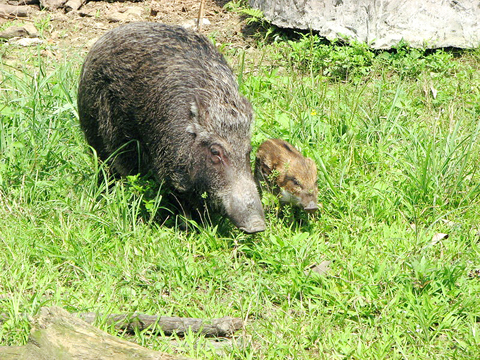The Taipei Zoo recently celebrated the birth of a Formosan wild boar, the first time the zoo has bred the animal, which is endemic to Taiwan, under a preservation program in cooperation with National Taiwan University to keep the purebred strain of the boar alive.
Taipei Zoo director Jason Yeh (葉傑生) announced yesterday that the male boar, born on Feb. 21, was named “Tai An” (泰安) because the breeders hoped it would grow in a healthy and safe way.
It was also hoped that Tai An would be able to reproduce in the future, Yeh said, adding that it had become increasingly unusual to spot pure-blood Formosan wild boars in Taiwan’s mountainous areas, where the animals once thrived.

PHOTO: CHIU SHAO-WEN, TAIPEI TIMES
Some hog breeders living in the mountains have let their stock run around without fencing them in, raising the chances of cross-breeding between domestic pigs and wild boars, Yeh said.
Citing research findings, Yeh said there had been a lot of hybrid wild boars spotted in the mountains in recent years whose physical characteristics, such as fur color and the shape of the ears, are seen to be different from those of purebred Formosan wild boars.
Although the wild animal is not categorized as an endangered species in Taiwan, the zoo decided to launch its effort to preserve the strain. The boars live in groups in hilly and mountainous areas around the nation, Yeh said.
The Taipei Zoo has a pair of pure-blood Formosan wild boars and Tai An is their first offspring born under the zoo’s preservation program, the zoo said.

The brilliant blue waters, thick foliage and bucolic atmosphere on this seemingly idyllic archipelago deep in the Pacific Ocean belie the key role it now plays in a titanic geopolitical struggle. Palau is again on the front line as China, and the US and its allies prepare their forces in an intensifying contest for control over the Asia-Pacific region. The democratic nation of just 17,000 people hosts US-controlled airstrips and soon-to-be-completed radar installations that the US military describes as “critical” to monitoring vast swathes of water and airspace. It is also a key piece of the second island chain, a string of

A magnitude 5.9 earthquake that struck about 33km off the coast of Hualien City was the "main shock" in a series of quakes in the area, with aftershocks expected over the next three days, the Central Weather Administration (CWA) said yesterday. Prior to the magnitude 5.9 quake shaking most of Taiwan at 6:53pm yesterday, six other earthquakes stronger than a magnitude of 4, starting with a magnitude 5.5 quake at 6:09pm, occurred in the area. CWA Seismological Center Director Wu Chien-fu (吳健富) confirmed that the quakes were all part of the same series and that the magnitude 5.5 temblor was

Taiwan will now have four additional national holidays after the Legislative Yuan passed an amendment today, which also made Labor Day a national holiday for all sectors. The Chinese Nationalist Party (KMT) and Taiwan People’s Party (TPP) used their majority in the Legislative Yuan to pass the amendment to the Act on Implementing Memorial Days and State Holidays (紀念日及節日實施辦法), which the parties jointly proposed, in its third and final reading today. The legislature passed the bill to amend the act, which is currently enforced administratively, raising it to the legal level. The new legislation recognizes Confucius’ birthday on Sept. 28, the

The Central Weather Administration has issued a heat alert for southeastern Taiwan, warning of temperatures as high as 36°C today, while alerting some coastal areas of strong winds later in the day. Kaohsiung’s Neimen District (內門) and Pingtung County’s Neipu Township (內埔) are under an orange heat alert, which warns of temperatures as high as 36°C for three consecutive days, the CWA said, citing southwest winds. The heat would also extend to Tainan’s Nansi (楠西) and Yujing (玉井) districts, as well as Pingtung’s Gaoshu (高樹), Yanpu (鹽埔) and Majia (瑪家) townships, it said, forecasting highs of up to 36°C in those areas